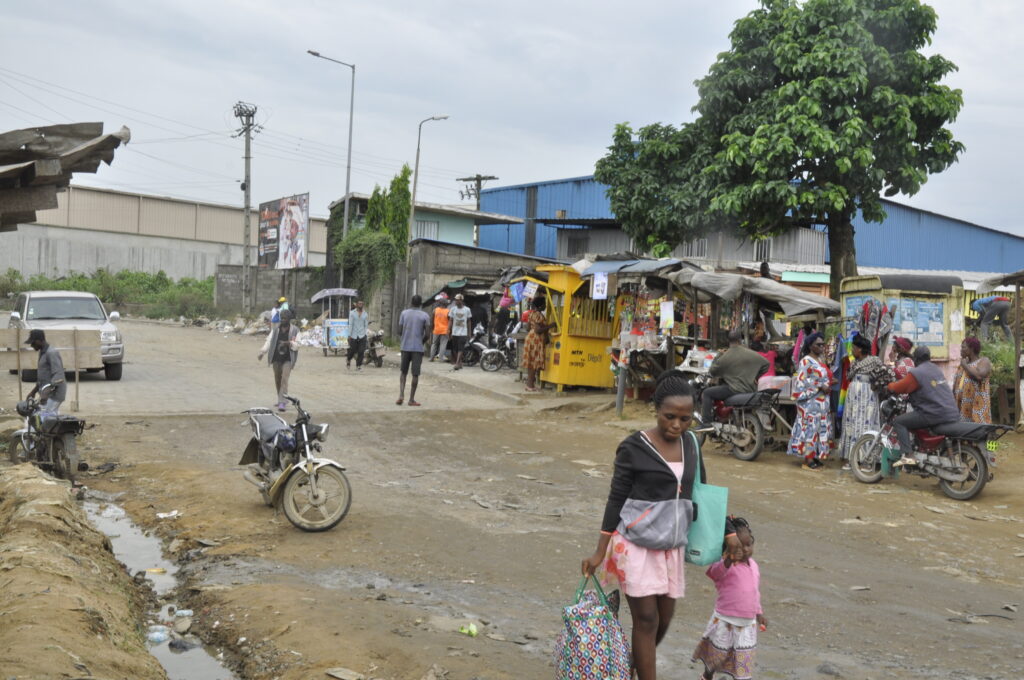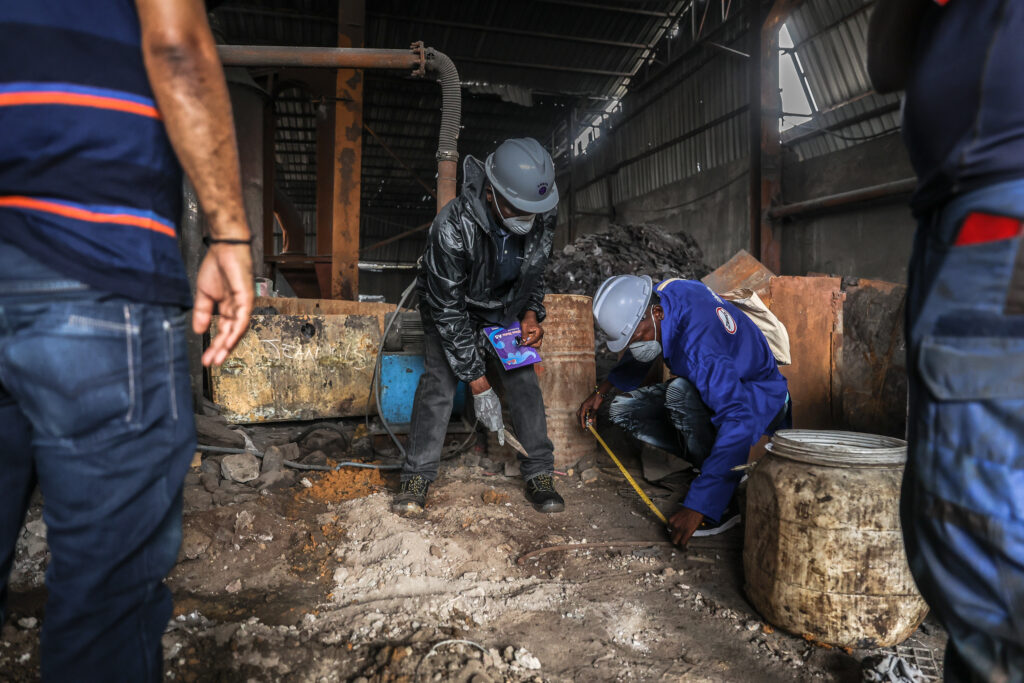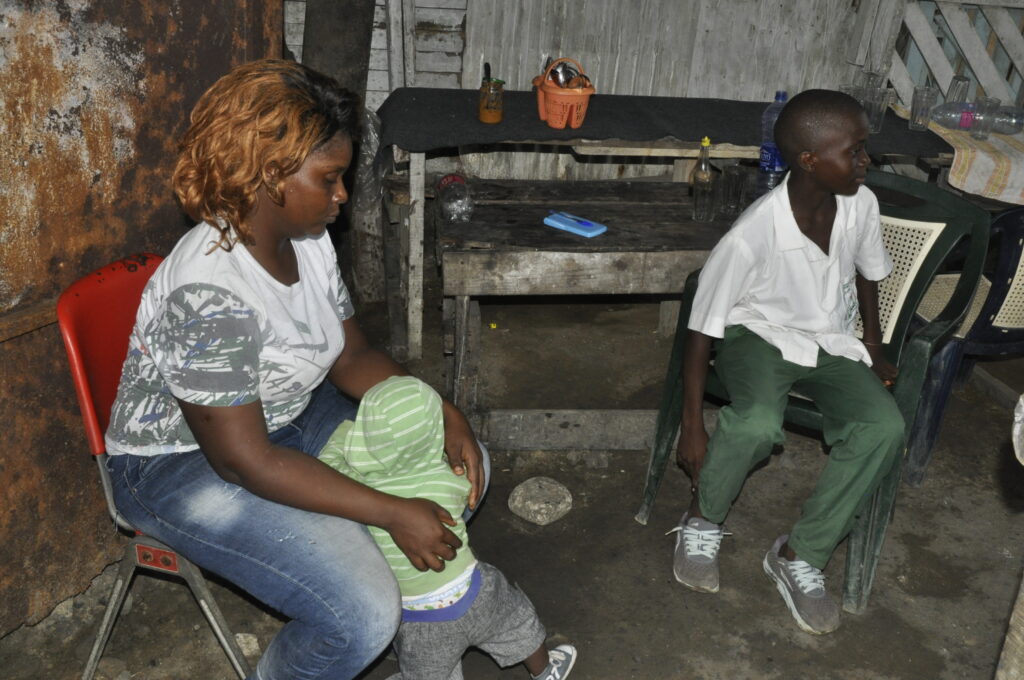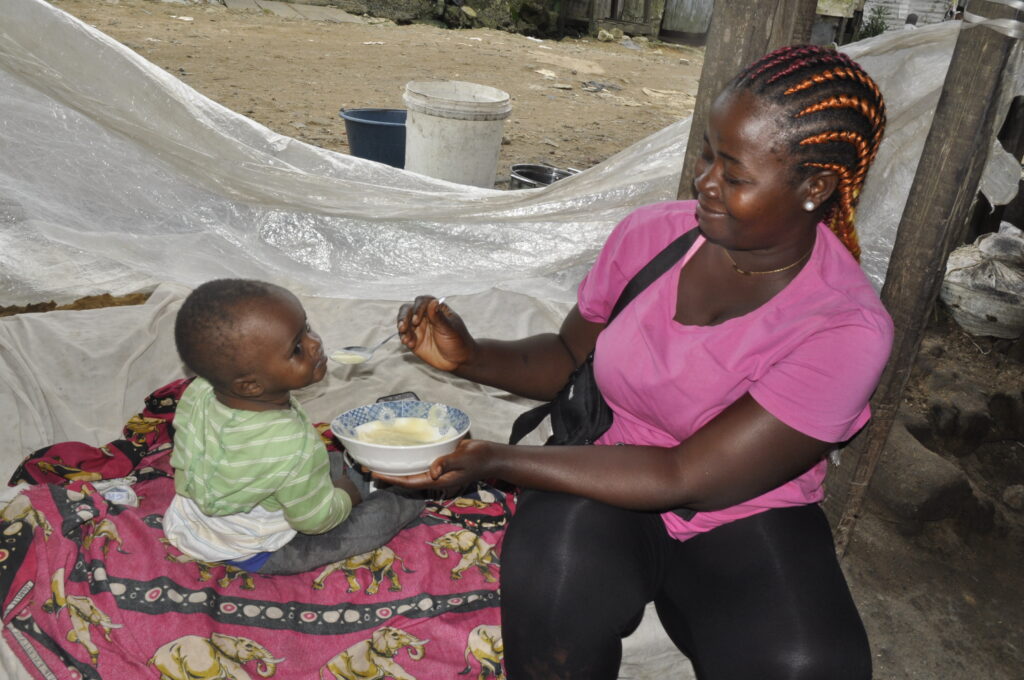In Cameroon: Lead-acid battery recycling plants are killing residents slowly

Whenever the sun sets, Agathe Ngo Nkot likes to relax at a place called Carrefour Bana, a corner of the Oyack district in the 3rd borough of the economic capital of Cameroon. Sitting near a speaker that vibrates urban music, she raises her voice to to speak to two women who are putting on makeup in front of the giant mirror of a hair salon.
Agathe, 41, has lived for two years about a hundred meters from the Bana crossroads. If she feels happy each time to return to this noisy place, it is not only to have fun with her loved ones. She takes advantage of the exchanges, she says, to forget for a moment the health concerns of Princess and Jules Merlin, her two young children who were born when she lived near the recycling plants for used lead acid batteries.
Agathe noticed when he was born that Jules Merlin was doing well, she says. Later, she discovered that her little boy, now three years old, still did not express himself. While those around her are still trying to understand the cause of this growth anomaly, Agathe gave birth six months ago to her last daughter, Princess, who contracted a lung infection. With this second hard blow, Agathe became afraid and left the Bana crossroads. She suspects factory fumes are responsible for her children’s misfortunes.
“I tell myself that this happened because of the smell of smoke coming from the industrial zone and entering the house,” said Agathe, rocking Princess in her arms. “The smells came from the people who make the batteries.”
Agathe is right to be worried. Without her knowledge, scientists recently took soil samples in and around the factories of Kyzen Global sarl, Metafrique Cameroun and Ganesha Cameroon, three companies specializing in the recycling of used lead batteries in the economic capital. After analysis, experts found that the communities near the factories where people live contain levels of “significant contamination” with lead which have negative effects on human health.
“The manufacturing and recycling of lead-acid batteries is an extremely dangerous industry,” said Perry Gottesfeld, executive director of Occupational Knowledge International (OK International), a US-based NGO involved in analyzing the lead-acid battery samples and soils and uses innovative strategies to reduce exposure to industrial pollutants. “Because, these processes involve the smelting of lead, which releases airborne lead fumes that are easily absorbed,” Gottesfeld added.
Experts further state that children exposed to lead fumes are more vulnerable.
For months, The Museba Project and the The Examination a non-profit US news organisation have investigated the health status of children born and raised near lead-acid battery recycling industries in Douala, and found that many of them suffer from growth retardation, lung infections, dizziness, vomiting, and mood disorders.
“Lead poisoning is little researched in our context,” Dr Wagou Nintcheu Irène, a medical biologist in Yaoundé, told The Museba Project. “The most important reason being that the majority of cases are asymptomatic for weeks to several months.”
Toxic odors

In Oyack, the industrial zone of Bassa (Ziba) has long been a source of pride. The Ziba has been managed since its creation in 1984 by the Mission for the Development and Management of Industrial Zones (Magzi), a state body responsible for promoting and managing industrial zones.
Ziba, which covers an area of 150 hectares, supervises nearly 150 companies operating in sectors such as industrial sawing, metallurgy, recycling and production. Five years ago, business owners created the Association of Businesses in the MAGZI Douala/Bassa industrial zone called “EZIMAD”.
One of the Association’s missions is to “reduce the environmental impacts of companies by helping them to comply” with environmental regulations. The Museba Project asked the Association’s permanent secretary if the effects of lead-acid battery recycling on local communities concerns Ezimad.
“Ezimad is based on the concept of industrial symbiosis which includes a more global approach to different types of industrial cooperation,” Marcel Dimitri Beat said in an email message. Difficult to understand all the same. And when a company does not comply with environmental regulations? “You are without doubt that the greatest weapon to impact people is awareness,” concluded the permanent secretary of Ezimad, also an expert in sustainable development.
If Ezimad does not do so, scientists are interested in the consequences of lead-acid battery recycling activities.
On July 6, 2023, experts from OK International and the Center for Research and Education for Development (CREPD), took soil samples to a maximum depth of 3 centimeters near the barriers, inside and outside the factories of Ganesha Cameroon sarl, Metafrique Cameroun SA and Kyzen Global sarl. This study commissioned by The Examination was necessary to establish the evidence of the impact of this industry on the environment and the health of populations, according to Dr Gilbert Kuepouo, geochemist and executive director of CREPD, a Cameroonian NGO which promotes sustainable development through the rational management of chemicals and dangerous products.

There was “a concern about fixing the chemical background of lead in the soil,” Dr Kuepouo said.
Lead is a highly toxic metal that produces a range of adverse health effects, particularly in young children. It is classified among the 10 most toxic chemical substances by the WHO, which does not recognize any level of exposure that is not dangerous to health. According to a recent study, lead is responsible for more than 5.5 million deaths worldwide each year.
Despite its harmfulness, lead is presented as the key to the future of renewable energy, transport, telecommunications and even agriculture. Lead-acid batteries account for more than 90% of global lead consumption and are one of the only growing uses of lead, experts say. This explains the hunt for lead carried out by the used battery recycling industry.
Temé Samba, a 50-year-old Malian citizen, owns a collection point for used lead-acid batteries located in the heart of Bépanda, a populous district of Douala. He buys the batteries according to the voltage from people, he says. When stocks are large, Samba resells these batteries by tonnage to industrial recycling companies, sometimes at more than 60,000 FCFA ($99) per unit.
“These companies provide us with documents to facilitate the transport of the batteries to the factory,” explains Samba standing in front of a pile of batteries of various brands. He says he has earned “a little” money in the 15 years he has been a collector without revealing the amounts. However, he is aware of the health consequences of handling lead batteries and began taking precautions well in advance.
“When I finish work in the evening, I first clean my hands with alcohol before going home. I store my work clothes in a corner of my store,” says Samba, father of 8 children. “I protect myself and I also protect my wife and my children because if they get sick, no one will help me treat them.”
The results of the research titled “Study on soil contamination in lead-acid battery recycling factories in Douala, Cameroon” revealed that soil contamination levels inside the three factories rose up to 7.6%, near fences 15% and more than 2% in factories.
The United States Environmental Protection Agency, (EPA), considers 0.08% as a reference value for the elimination of contaminated soils in residential neighborhoods and 0.04% for residential sites.

Agathe Ngo Nkot had noticed several times that the wind deposited particles on vegetable leaves and surrounding furniture. But, when the smoke invaded their homes, she thought she would do her children good by locking them in the house.
“I left the children in the house and closed the door before leaving because I couldn’t stand the smells which were intoxicating me,” says Agathe. “I protect myself with a muffler when I go to buy something.”
Agathe’s worries began a few days after the birth of her son Jules Merlin. “He has a problem: he doesn’t speak, he has a delay in getting words out. I said to myself that maybe his tongue is stuck but we said that there is nothing,” explains Agathe. “I was told that if there was money I had to enroll him in school and he could improve.”
Exposure to excessive levels of lead can cause brain damage, affect child growth, damage the kidneys, harm hearing, cause vomiting, headaches and loss of appetite, as well as learning and behavioral problems, experts say. Fetuses, infants, and children are particularly vulnerable to lead exposure compared to adults because lead is more easily absorbed by growing organisms. Additionally, young children’s tissues are more susceptible to the harmful effects of lead.
Agathe was unable to send the child to school due to lack of funds; her clothes are piled up in a corner of the living room of a benefactor who is hosting her and her children. Agathe has no job, she lives on the generosity of her neighbours. “People are helping me. My neighbour who sells food often gives me something to eat. The mother I live with also feeds me.”
“He’s breathing heavily.”
A few weeks after her birth, her daughter Princess had become a new source of concern because of her state of health. “For my baby Princess, instead of gaining weight, she is losing weight,” says Agathe, adjusting the cap placed on her head. “At the hospital, we first said it was malnutrition. Later, it was discovered at the hospital that she had lung infection.”
After the treatment, Agathe said she did an x-ray which confirmed that Princess no longer suffered from a lung infection.
Kyzen Global sarl is a member company of Ezimad which has a lead-acid battery recycling plant located at the Bana crossroads near a sparse housing block where around 2,000 people live.
Since July 2016, Kyzen has obtained an environmental permit from government authorities which gives this Indian-controlled company authorization to carry out import-export operations with its foreign partners, the majority of which are of Indian origin. According to Cameroonian customs data, an Indian firm delivered hundreds of rotary kiln parts and filtration bags worth several tens of millions of FCFA to Kyzen via the port of Kribi in 2021.
On the environmental level, experts say they have found lead levels of 1.6% at the factory, 15% at the fence and these experts speak of “significant contamination”.
“Christian suffers from respiratory problems, when it starts, he breathes heavily,” explains Virginie while peeling potatoes near her 9-month-old grandson who is fast asleep.
Talom Virginie runs a restaurant specializing in the sale of local dishes located about twenty meters from the Kyzen factory. Two of Virginie’s three children, Christian, 14, and Stéphane, 10, regularly have health problems.
Virginie says she had medical examinations which were all negative. At the hospital, the staff explained to him that Christian’s airway is “small” but should widen as the child gets older. There is still no change, she said.
“When he coughs, he says his ribs hurt.”
For two months, Stéphane’s nostrils have been running every morning, says Virginie, who has lived in the block since 2008. “When it’s like this, I give him medicine and it calms down then it comes back later,” explains Virginie. She says that she cleans the restaurant’s utensils several times, which are often invaded by particles from the fumes.
Lead-acid batteries contain sulfuric acid and large amounts of lead, the EPA says. The acid, being extremely corrosive, constitutes a good vector for soluble lead and lead particles. If the acid leaks onto the ground, it can contaminate the soil, which then becomes a source of lead particles as the solution dries and the lead becomes incorporated into the soil particles which may be blown up by moving vehicles or carried by the wind.
Another resident, Liliane Judith, 33, says she gives unsweetened milk from time to time to her two daughters aged 4 and 7 who suffer from coughs, flu and vomiting.
The industry that brings development is killing us
“Even at night, the smoke prevents us from studying at home and sleeping, it shocks me because we must above all preserve the environment,” laments Christian Tonang, a final year science student at the Lycée d’ Oyak.
“The same industry that tells us it is bringing development, is the same one that is killing us.”
Part of the population showed their anger when they were evicted by the authorities so that Kyzen could settle down. Later, several unemployed young people saw Kyzen’s arrival as an opportunity to escape joblessness but they changed their minds, says Paul Siledjé, the head of block 7.
“These young people gave up because of the high heat, toxic smoke and poor working conditions,” Siledjé told The Museba Project during the course. “They sometimes worked barefoot, without protective masks, without helmets, they have no personal protection, safety or monitoring equipment.”
Siledjé said he settled in the locality 30 years ago and became block chief for 15 years. He says his people are complaining about smoke and other waste coming from the battery recycling plant but he tells them there is nothing he can do.
“The water mixed with acid and lead that leaves the factory flows to the bottom in the swamps where small children play,” Siledjé explained.
The head of the block says he took a delegation of local residents who met with a Kyzen official.
“There, the manager let us know that he has all the papers that authorize him to settle in this area,” Silédjé said. “I have no power to tell them to leave.”
Kyzen Global sarl did not respond to questions from The Museba Project despite several reminders.
Cameroon is known as one of the countries with a low employment rate in urban areas. Every day, job seekers are ready to do the most unthinkable of activities in metropolises like Douala to earn a living; but when it comes to working in a used lead acid battery recycling plant, not many people are interested.
Metafrique Cameroon, another lead battery recycling plant is located approximately 500 meters from the Kyzen facilities. Experts say they took soil samples in the residential area of Oyack near a school, hospital, grocery stores and found lead levels 20 times higher than what the EPA considers as a threat to public health.
“The soil sample must have been taken from the battery waste storage area. If this were the case, the sample taken would contain 100%, otherwise I cannot justify other reasons,” said Ahmed Jaber, the Managing Director of Metafrique Cameroun in an interview with The Examination.
Metafrique Cameroun, holder of an environmental permit obtained from the authorities in April 2014, subcontracts its recycling activity to a Cameroonian SME which hires and pays workers to do the job.
Arun Goswami, who is presented in court and industrial free zone documents as the CEO of Metafrique Cameroun, in an interview with The Examination, declared that “neither I nor my family hold shares in the group’s companies. Metafrique, whether directly or indirectly.”
Mirabelle and Minette sell food in the restaurants about ten meters from the Metafrique factory. When the smoke emissions from the factory become threatening, they protect their nostrils with handkerchiefs or mufflers, they say. After the restaurant, these mothers return home, greeted by small children who touch their clothes and utensils covered in harmful particles.
“It’s God who protects us,” said Mirabelle. “I have never been told that the child has such an illness because of the smoke,” says Minette.
In 2013, the Association of African Journalists for the Environment (Ajafe) published a report accusing Metafrique Cameroun of having sickened employees and residents near the factory, reporting cases of coughing, nausea and rashes.
“I am not aware of any such report. If it exists, it must be false and considered propaganda,” Ahmed Jaber told The Examination.
In 2018, a scientific paper examined the presence of lead in soil in and around lead-acid battery recycling plants in Africa. Metafrique Cameroun was one of the companies examined.
Soil tested outside the Metafrique factory had the highest result in Cameroon and the third highest in Africa: 19,000 milligrams of lead per kilogram. This result is nearly 50 times higher than what the EPA considers a baseline for the disposal of contaminated soil in residential neighborhoods.
Ahmed Jaber says he has “no idea” about this report.
Goswami said that “we have always complied with the local standards and legal requirements of the country in which we operate.”
The mayor of the commune of Douala 3rd contacted by telephone did not wish to respond to The Museba Project. An executive from this town hall, who was not authorized to speak to the press, however indicated anonymously “we believed that these companies operate in symbiosis with the populations, we did not know that there were complaints”.
On a cool morning in November 2023, Henriette is dressed in an old turtleneck polo shirt, black pants with plastic shoes on her feet. Using a hoe, she weeds her half-hectare “ndolé” field located near a worn wall of the Ganesha Cameroon sarl factory, in the heart of the Bonaberi free enterprise zone, to the west of the city of Douala.
In Cameroon, “ndolé” is as popular as football.
This local dish made from the green leaves of vernonia has people drooling for its exquisite taste. Previously, vernonia was grown on small plots near village homes for family consumption. Over time, the growing demand for ndolé even beyond national borders has forced growers like Henriette to acquire larger areas to increase supply.
During the holidays, this sixty-year-old takes her grandsons to the field to work but she always finds herself alone a few hours later.
“Each time, the children scratch their eyes and are poisoned by the strong odors. Their mother insisted that the children continue to work, protecting themselves with mufflers, but at one point, it became unbearable, she decided that she and the children would no longer set foot in the fields,” says Henriette, looking dejected.
During their visit last July, experts say they collected soil samples inside the Ganesha factory near the main hangar and two other “composite” samples approximately 100 and 350 meters from the factory, precisely in the surrounding agricultural fields like Henriette’s.
Agricultural fields located up to 100 meters from the plant had lead concentrations more than 70 times higher than the EPA’s benchmark for disposal of contaminated soil in residential sites.
Bad news for Henriette’s grandchildren because concentrations above 0.008% are considered dangerous for children, experts say.
Henriette’s grandchildren suffer from coughs and flu, she says. They should carry out tests to detect lead and know the extent of the contamination, advised the scientists who point out that lead is a chemical substance that is very toxic to the human body even when it is in low doses.
Missing regulations
“The population is not informed about the risk factors for lead contamination and even less about the clinical manifestations,” declared Dr Irène Wagou Nintcheu, who said that it takes on average 30,000 CFA francs to carry out blood test for lead. “In the long term, inhalation can lead to stunted growth, intellectual deficit, and refractory anemia.”
The Museba Project sent a questionnaire to Ganesha Cameroon at their request, but they did not respond.
Cameroon does not have specific regulations governing the used lead battery recycling industry. The law on such industries classifies as dangerous, unhealthy or inconvenient industries generating solid, liquid or gaseous pollution such as factories must self-monitor their discharges. And are subject to payment of the annual pollution tax when they pollute the environment.
“These industries take advantage of the weakness or absence of the legal framework by not investing in clean technologies and appropriate pollution control equipment,” said Dr Kuepouo.
Contacted for this article, the Minister of the Environment did not comment.
Experts also noted other shortcomings at the disposal of recycling companies: the absence of an effluent treatment station, the transport of batteries to the factory in ordinary trucks, the manual dismantling of batteries by workers without adequate personal protective gear, the absence of a hazardous waste flow management system, the absence of ventilation or air filtration system.
“We should set up a commission responsible for lobbying internationally to force these companies to respect the recommendations and make their activity more humane,” says Alain Fréjus Ngompe, the executive director of Ajafe.
Agathe Ngo Nkot lost sleep because of her sick children. She lost sight of her partner who “ran away” after her last pregnancy. Now, she only has one wish: “that the fumes no longer bother us”.
This investigation is co-published with The Museba Project.
